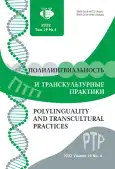Translinguality as an Explication of Appellative Character of Urban Names
- Authors: Poplavskaia T.V.1, Shylei A.V.1
-
Affiliations:
- Minsk State Linguistic University
- Issue: Vol 19, No 4 (2022)
- Pages: 596-602
- Section: Language Processes
- URL: https://journal-vniispk.ru/2618-897X/article/view/326729
- DOI: https://doi.org/10.22363/2618-897X-2022-19-4-596-602
- ID: 326729
Cite item
Abstract
Modern urban names are characterized by properties that allow them to be simultaneously attributed to a special type of mass communication, to episodes of external communication of an organization and acts of self-presentation. A necessary condition for promoting an organization is the formation of trust among the target audience, and strategies for building trust are verbalized through the name to great extend. Within the framework of a single cognitive space, the name of the organization serves as a kind of trigger that includes interest in the organization as a kind of manifestation of feedback: intellectual / mental (I need it), emotional (pleasant place), behavioral (contacting the organization), verbal (discussion).One of the ways to form the attractiveness of names that appeal to the target audience and create a positive image of the organization is to embody the principles of translinguism in urban names. The essence of using the principles of translingualism is the appeal to the entire communicative repertoire of the speaker, as a result of which languages and cultures smoothly flow into each other. When creating the names of urban objects, translatinguality is manifested in the successful use of various language codes. In some cases, the choice of the nominating subject in favor of a particular language in the name of the company is determined by the specifics of the organization’s activities. One of the purposes of using words of foreign origin in the names of organizations is to mimic an imported brand as the level of trust of the target audience in the goods of domestic producers is often lower than in foreign ones. Modern names show more and more varied types of translingual combinations. A common manifestation of translingualism in ergonymy is the contamination of codes, that is, the combination in the name of the organization of units of different languages. Since in a number of cases the intended perception of the meaning of names of this kind is based not only on an adequate understanding of its foreign language component, but also on acquaintance with the realities of another culture that underlie such discursive elements, it is possible to postulate the transcultural nature of a significant part of modern urban names.
About the authors
Tatiana V. Poplavskaia
Minsk State Linguistic University
Author for correspondence.
Email: taniapoplavskaia@gmail.com
Doctor of Philology, Professor, Head of the Department of Speech Science and Communication Theory 21, st. Zakharova, Minsk, 220034, Belarus
Alena V. Shylei
Minsk State Linguistic University
Email: helen_kobzik@mail.ru
Candidate of Philology, Associate Professor of the Department of Speech Studies and Theory of Communication 21, st. Zakharova, Minsk, 220034, Belarus
References
- Mescon, M.H., Albert M., Khedouri F. 2004. Management. 2-nd ed. Moscow: Delo. Print. (In Russ.)
- Arkin, R.M. Kolditz, T.A. 1982. “An impression management interpretation of the selfhandicapping
- strategy”. Journal of Personality and Social Psychology 43(3):492—502. https://doi.org/10.1037/0022-3514.43.3.492
- Kubriakova, E.S. 1994. “Nachal’nye etapy stanovleniia kognitivizma: lingvistika — psihologiia — kognitivnaia nauka”. Voprosy iazykoznaniia 4: 34—47. Print. (In Russ.)
- Kubriakova, E.S. 2004. Ob ustanovkakh kognitivnoi nauki i aktual’nykh problemakh kognitivnoi lingvistiki. Voprosy kognitivnoi lingvistiki 1: 6—17. Print. (In Russ.)
- Pavilyonis, R.I. 1983. Problema smysla: Logiko-funkcionalnyj analiz yazyka. Moscow: Mysl publ. Print. (In Russ.)
- Arkin, R.M. Kolditz, T.A., 1982. An impression management interpretation of the self-handicapping strategy. Journal of Personality and Social Psychology, 43(3), 492—502. https://doi.org/10.1037/0022-3514.43.3.492
- Schutz, A. Problems of a Sociology of Language. 2010. Schutzian Research. Vol.2. P. 65—105. doi: schutz201025.
- Schutz, A. Collected papers 1. The problem of social reality. Heinemann Educational Books, London.
- Zverintsev, A.B. 1997. Kommunikatsionnyi menedzhment. Rabochaia kniga menedzhera. Saint Petersburg. Print. (In Russ.)
Supplementary files









